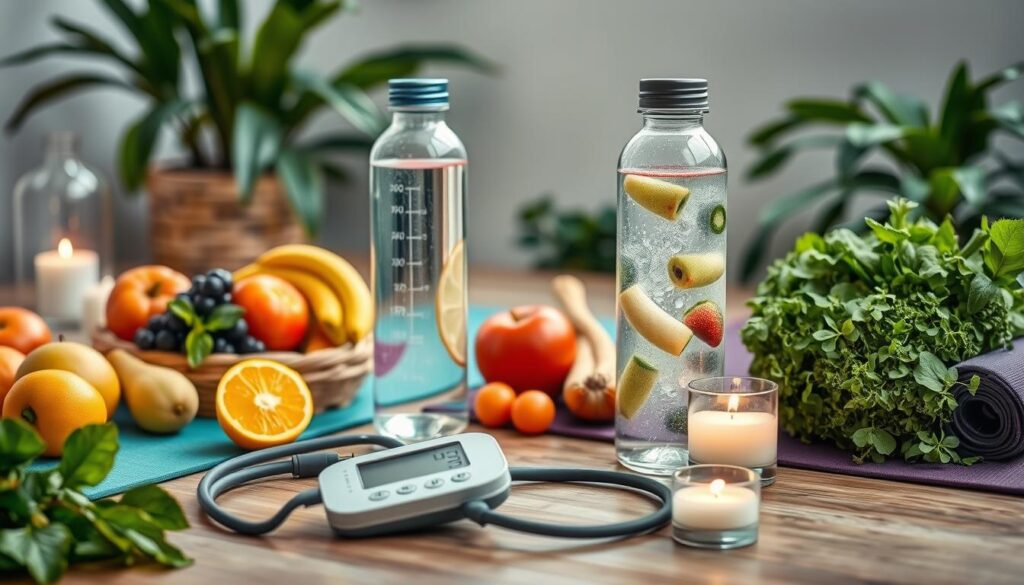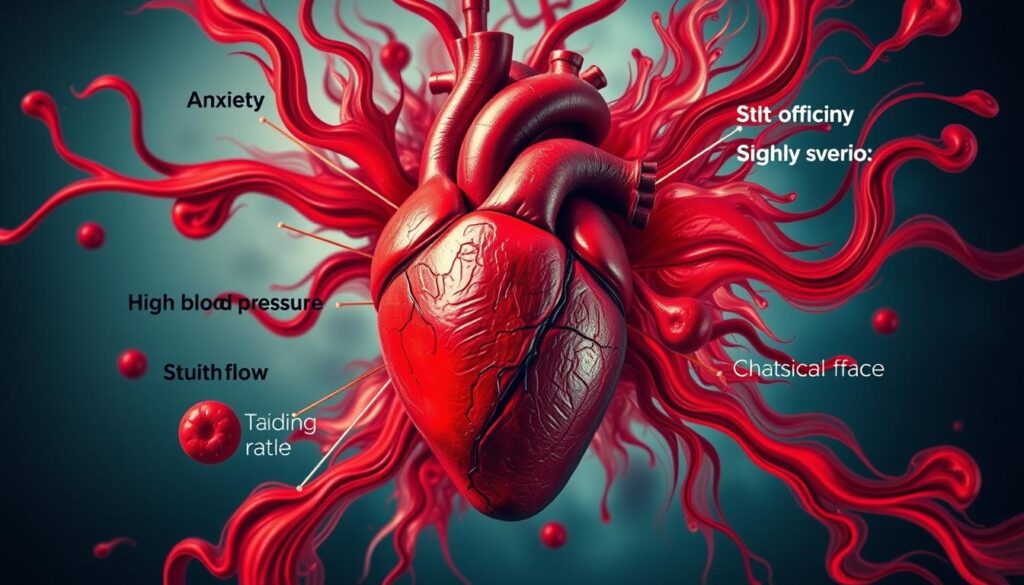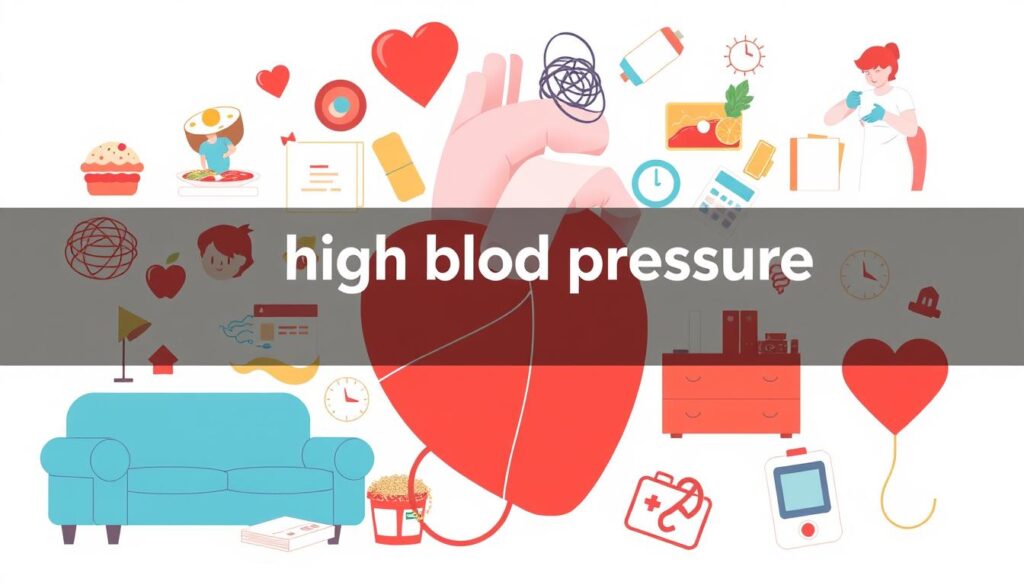High blood pressure, or hypertension, is a common health issue affecting millions globally. It’s important to know the symptoms and how to manage it to keep your heart healthy. But how can you tell if you have high blood pressure, and what can you do to lower it? This article will help you understand hypertension better. It aims to give you the tools to manage your health and lower the risks of this condition.

Understanding High Blood Pressure: A Comprehensive Overview
High blood pressure, or hypertension, is a common health issue affecting millions globally. It’s important to know the different types, normal ranges, and risk factors. This knowledge helps manage blood pressure effectively.
Types of Hypertension
There are two main types of hypertension: primary (essential) and secondary. Primary hypertension is the most common, making up 90-95% of cases. It develops over time due to genetics, lifestyle, and environment. Secondary hypertension is caused by another medical condition, like kidney disease or certain medications.
Normal vs. Elevated Blood Pressure Ranges
The American Heart Association says normal blood pressure is under 120/80 mmHg. Elevated blood pressure is between 120-129 mmHg systolic and under 80 mmHg diastolic. Hypertension is diagnosed at 130 mmHg systolic or 80 mmHg diastolic or higher.
Risk Factors and Causes
Many factors can raise your risk of high blood pressure. These include genetics, family history, age, obesity, and poor diet. Lack of exercise, too much alcohol, and conditions like diabetes or kidney disease also play a role. Knowing and managing these risk factors is key to good cardiovascular health.

Common Symptoms of High Blood Pressure
High blood pressure, also known as hypertension, is often called the “silent killer.” This is because many people with it don’t show any high blood pressure symptoms. In fact, hypertension can go on for years without any signs or symptoms. So, it’s very important for people to get their blood pressure checked regularly.
Some people with high blood pressure might feel a few subtle symptoms. These include:
- Headaches
- Dizziness or lightheadedness
- Chest pain or tightness
- Shortness of breath
- Pounding in the ears or neck
- Nosebleeds
It’s key to remember that having these symptoms doesn’t always mean your blood pressure is very high. Some people with very high hypertension might not feel anything at all. Others might feel one or more of these signs, even if their blood pressure is only slightly high.
The only way to really know if you have high blood pressure symptoms is to get your blood pressure checked regularly. Doctors say everyone should have their blood pressure checked at least once every two years. If you have heart disease or other risk factors, you might need to get checked more often.
| Symptom | Description |
|---|---|
| Headaches | Persistent or frequent headaches, particularly in the morning, may be a sign of high blood pressure. |
| Dizziness or Lightheadedness | Feeling dizzy, lightheaded, or unsteady on your feet can be a symptom of high blood pressure. |
| Chest Pain or Tightness | High blood pressure can cause chest pain or a sensation of tightness or pressure in the chest. |
| Shortness of Breath | Difficulty breathing or feeling like you can’t get enough air can be a sign of high blood pressure. |
| Pounding in the Ears or Neck | A pounding or throbbing sensation in the ears or neck may indicate high blood pressure. |
| Nosebleeds | Frequent or unexplained nosebleeds can be a symptom of uncontrolled high blood pressure. |
Even if you don’t feel any high blood pressure symptoms, it doesn’t mean you’re not at risk. Regular doctor visits are key to catching and managing this serious condition.

Risk Factors for Developing Hypertensive Disorders
Knowing the risk factors for hypertensive disorders is key to preventing and managing high blood pressure. These factors fall into three main groups: genetic and family history, lifestyle, and medical conditions.
Genetic and Family History
If you have a family member with high blood pressure, you’re at higher risk. This is because of genetics. Some people are more likely to get high blood pressure due to their genes.
Lifestyle-Related Risk Factors
Your diet, exercise, and stress levels can affect your risk of hypertensive disorders. Eating too much salt, fat, and processed foods can raise blood pressure. Not moving enough and chronic stress also increase the risk.
Medical Conditions That Increase Risk
Some health issues can raise your risk of hypertensive disorders. These include obesity, diabetes, kidney disease, and sleep apnea. People with these conditions need closer monitoring of their blood pressure.
| Risk Factor | Description | Relative Risk |
|---|---|---|
| Family History | Having a close blood relative with high blood pressure | 2-4 times higher |
| Obesity | Body Mass Index (BMI) of 30 or higher | 2-6 times higher |
| Diabetes | Chronic condition affecting blood sugar regulation | 1.5-3 times higher |
| Sedentary Lifestyle | Lack of regular physical activity | 1.5-2 times higher |
By knowing these risk factors, you can take steps to lower your risk of hypertensive disorders. This helps keep your heart healthy.

Diagnosing and Monitoring Blood Pressure
Keeping your blood pressure healthy is key to feeling good. It’s important to get it right and check it often. This helps avoid big health problems. Let’s look at how to diagnose and keep an eye on blood pressure.
Measuring Blood Pressure Accurately
Getting your blood pressure right is the first step. Doctors use a special device called a sphygmomanometer. It shows how hard your blood is pushing against your artery walls. It’s important to use the right method and follow the rules to get good readings.
Home Blood Pressure Monitoring
Checking your blood pressure at home is also important. There are easy-to-use devices that help you track your blood pressure. This gives your doctor useful information to help you.
- Helps identify patterns and trends in blood pressure fluctuations
- Enables early detection of elevated blood pressure
- Allows for better management of hypertension through lifestyle changes and medication adjustments
Ambulatory Blood Pressure Monitoring
At times, doctors might suggest ambulatory blood pressure monitoring. This means wearing a device that checks your blood pressure at set times for 24 hours. It shows how your blood pressure changes during the day and night.
Getting your blood pressure right and checking it often is key. Knowing how to do it helps you work with your doctor. This way, you can keep your blood pressure healthy and avoid serious health issues.
Lifestyle Modifications for Blood Pressure Management
Managing high blood pressure often needs more than just medicine. Making lifestyle changes is key to keeping blood pressure healthy. This section looks at important lifestyle changes for better blood pressure control.
Dietary Changes and DASH Diet
Changing your diet is a big step in managing blood pressure. The DASH diet is a top choice. It focuses on eating whole foods and cutting down on sodium, fats, and sugars.
- Eat more fruits, veggies, whole grains, and lean proteins
- Reduce sodium, processed foods, and high-fat dairy
- Choose foods high in potassium, like bananas and leafy greens
Exercise and Physical Activity
Regular exercise is vital for blood pressure control. Activities like brisk walking, swimming, or cycling are great. They help lower blood pressure and boost heart health.
- Do at least 30 minutes of moderate exercise daily
- Add strength training to build muscle and improve metabolism
- Work with a doctor to create a fitness plan
Stress Management Techniques
Stress can raise blood pressure. Using stress management can help keep your heart healthy. It’s important to find ways to handle stress well.
| Stress Management Technique | Benefits for Blood Pressure |
|---|---|
| Meditation | Reduces stress hormones and promotes relaxation |
| Deep Breathing Exercises | Lowers blood pressure and heart rate |
| Yoga | Combines physical activity with mindfulness, lowering stress levels |
By making dietary changes, exercising regularly, and managing stress, you can actively manage high blood pressure. This approach can lower the risk of serious health problems.
Medications and Treatment Options
Managing high blood pressure often requires a mix of lifestyle changes and medications. These antihypertensive medications target different body mechanisms to lower blood pressure.
There are several types of antihypertensive medications used to treat high blood pressure:
- Diuretics help remove excess fluid and sodium, easing the heart’s workload.
- ACE inhibitors block a hormone that narrows blood vessels, lowering blood pressure.
- Angiotensin II receptor blockers (ARBs) work like ACE inhibitors, causing blood vessels to relax.
- Calcium channel blockers widen blood vessels, improving blood flow and lowering pressure.
- Beta-blockers slow the heart rate and reduce its force, lowering blood pressure.
Choosing the right high blood pressure treatment is crucial. It depends on age, health, and how well you respond to medications. Sticking to your treatment plan and regular check-ups are key to managing high blood pressure and avoiding complications.
| Medication Class | Mechanism of Action | Potential Side Effects |
|---|---|---|
| Diuretics | Eliminate excess fluid and sodium | Dehydration, electrolyte imbalances |
| ACE Inhibitors | Prevent angiotensin II production | Cough, dizziness, kidney problems |
| ARBs | Block angiotensin II receptors | Dizziness, headache, swelling |
| Calcium Channel Blockers | Relax and widen blood vessels | Headache, constipation, swelling |
| Beta-blockers | Reduce heart rate and force of contractions | Fatigue, cold extremities, wheezing |
Knowing about antihypertensive medications and how they work helps you and your doctor create a treatment plan. This plan should manage your high blood pressure and reduce risks of complications.
Natural Remedies and Alternative Approaches
Many people are looking into natural remedies and alternative methods for high blood pressure. These options can offer extra benefits and help with a holistic health approach.
Herbal Supplements
Some herbal supplements might help keep blood pressure healthy. Here are a few herbs that have been studied:
- Garlic: It might help relax blood vessels and improve blood flow.
- Hibiscus: This flower has diuretic properties that could reduce fluid retention and lower blood pressure.
- Hawthorn: It has antioxidants and may improve heart health and regulate blood pressure.
Before adding herbal supplements to your routine, talk to a healthcare provider. They can warn about possible interactions or side effects.
Mind-Body Practices
There are also mind-body practices that might help with high blood pressure. These include:
- Meditation: It can reduce stress and lower blood pressure.
- Yoga: Yoga combines physical postures, breathing, and mindfulness to relax and support heart health.
- Tai Chi: This martial art combines physical and mental exercises, which may help manage blood pressure.
Adding these practices to your life, along with your healthcare provider’s advice, can be part of a full plan to manage high blood pressure.
| Herbal Supplement | Potential Benefits for High Blood Pressure |
|---|---|
| Garlic | May help relax blood vessels and improve blood flow |
| Hibiscus | May have diuretic properties to reduce fluid retention and lower blood pressure |
| Hawthorn | Contains antioxidants and may help improve heart health and regulate blood pressure |
“Incorporating natural remedies and alternative approaches can be a valuable part of a comprehensive strategy to manage high blood pressure, but it’s crucial to work closely with a healthcare provider to ensure safety and effectiveness.”
Preventing Complications of High Blood Pressure
High blood pressure, or hypertension, can harm your heart and increase heart disease risk. Understanding the risks and taking action can help manage your blood pressure. This protects your overall health.
High blood pressure can lead to cardiovascular disease. It damages blood vessels and strains the heart. This increases the risk of heart attacks and strokes. It can also cause kidney disease and cognitive decline.
To avoid these problems, controlling your blood pressure is key. This includes lifestyle changes and, if needed, medication. Monitoring your blood pressure, eating right, exercising, and managing stress are all important. They help keep your blood pressure healthy and lower heart disease risk.
Preventing Complications Through Lifestyle Changes
- Eat a heart-healthy diet, like the DASH diet, which focuses on fruits, vegetables, and whole grains.
- Do at least 30 minutes of physical activity, like brisk walking or swimming, most days.
- Use stress-reducing techniques, such as meditation or yoga, to lower blood pressure.
- Keep a healthy weight to avoid high blood pressure.
- Reduce sodium, alcohol, and caffeine intake, as they can harm blood pressure.
By changing your lifestyle and working with your doctor, you can manage high blood pressure. This reduces the risk of serious heart problems. Taking action now helps protect your cardiovascular health for the long term.
When to Seek Emergency Medical Care
It’s important to know the signs of a hypertensive crisis. People with high blood pressure need to watch for symptoms. They should get medical help right away if they see any warning signs.
Warning Signs and Red Flags
Here are some warning signs of a hypertensive crisis:
- Severe headache
- Chest pain
- Shortness of breath
- Nausea or vomiting
- Dizziness or lightheadedness
- Blurred vision
- Irregular or rapid heartbeat
If you notice any of these high blood pressure symptoms, call for emergency help. A hypertensive crisis is very serious and needs quick action.
Emergency Response Protocol
Here’s what to do if you think you’re having a hypertensive crisis:
- Call 911 or your local emergency services right away.
- Stay calm and try to check your blood pressure if you can.
- Don’t take any medicine unless a doctor tells you to.
- If you have nitroglycerin, use it as directed.
- Wait for the emergency team to arrive and do what they say.
Quick medical help is key to keeping you safe. If you’re worried about your high blood pressure symptoms, don’t wait. Get emergency care right away.
Conclusion
Keeping blood pressure in check is key to heart health and avoiding serious problems. This article has covered symptoms, risk factors, and ways to manage high blood pressure.
Knowing how to monitor blood pressure and make healthy choices is important. Adopting a balanced diet, exercising more, and following treatment plans can help. These steps are clear and can be followed by anyone.
With this information, people can work with their doctors to manage their blood pressure. This focus on heart health can lead to a better, longer life. It helps avoid the issues that come with high blood pressure.
FAQ
What is high blood pressure?
High blood pressure, also known as hypertension, is when blood pressure is too high. It can cause serious health issues if not treated.
What are the symptoms of high blood pressure?
Many people with high blood pressure don’t show symptoms. It’s often called the “silent killer” because it’s hard to detect. Symptoms like headaches, shortness of breath, and nosebleeds can occur. Regular check-ups are key for diagnosis.
What are the risk factors for developing high blood pressure?
Risk factors include family history, age, being overweight, and not being active. Poor diet, too much alcohol, and certain diseases also increase risk.
How is high blood pressure diagnosed and monitored?
High blood pressure is diagnosed with a simple blood test. This can be done at a doctor’s office or at home. Regular checks are important for managing it.
What lifestyle changes can help manage high blood pressure?
To manage high blood pressure, eat a healthy diet, like the DASH diet. Stay active, maintain a healthy weight, manage stress, and limit alcohol and sodium.
What medications are used to treat high blood pressure?
Medications include diuretics, ACE inhibitors, and beta-blockers. The right medication depends on the individual’s health and condition.
Are there any natural or alternative treatments for high blood pressure?
Herbal supplements and practices like meditation may help. But, always talk to a doctor first. They can ensure safety and avoid risks.
How can I prevent complications from high blood pressure?
Control blood pressure with lifestyle changes and medication. This can prevent heart disease, stroke, and kidney damage. Regular monitoring is key.
When should I seek emergency medical care for high blood pressure?
Seek emergency care for severe headache, chest pain, shortness of breath, or vision changes. These could be signs of a hypertensive crisis, which is dangerous.
